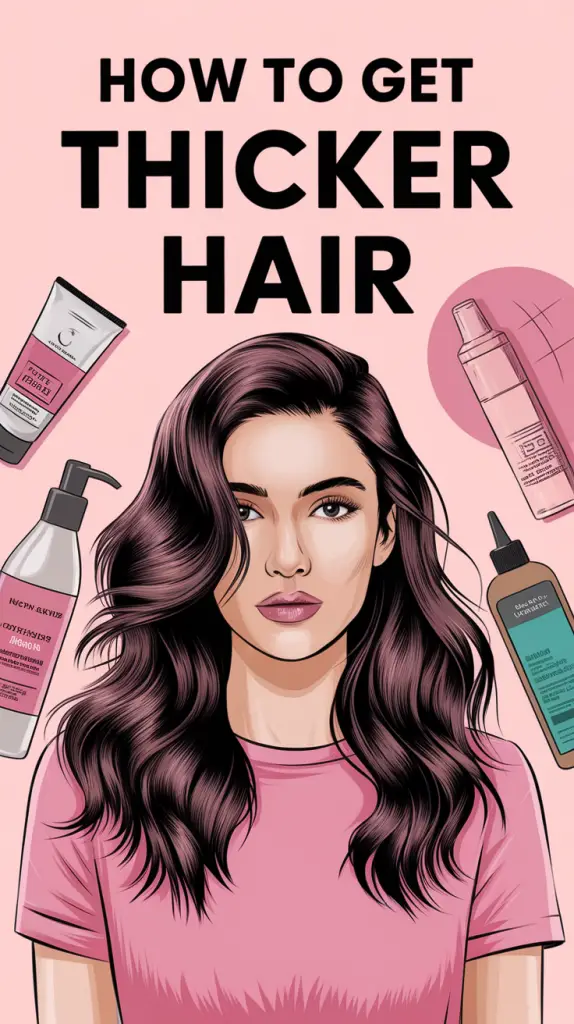How to Achieve Thicker Hair: The Complete Guide
Having thick, voluminous hair is often associated with beauty, health, and confidence. However, many of us struggle with thinning or flat hair, leaving us searching for effective solutions. The good news is that achieving thicker hair is not an impossible task. While genetics certainly play a role in how thick our hair naturally is, there are various steps you can take to boost its volume and density.
In this guide, I’ll walk you through proven methods and practical tips that can help you get thicker hair, from the food you eat to the products you use and even lifestyle habits you can incorporate into your daily routine.

1. Maintain a Nutrient-Rich Diet
To support your hair’s health and thickness, it’s essential to provide it with the right nutrients. Consuming a balanced diet can encourage thicker, stronger hair by giving your follicles the nutrients they need to grow.
Key Nutrients for Thicker Hair:
| Nutrient | Sources | Benefits |
|---|---|---|
| Protein | Eggs, lean meats, fish, legumes | Hair is made of keratin, a protein that strengthens hair |
| Vitamin A | Sweet potatoes, carrots, spinach | Promotes healthy scalp and oil production |
| Vitamin C | Citrus fruits, berries, bell peppers | Aids in collagen production for hair strength |
| Vitamin E | Almonds, avocados, spinach | Improves blood circulation to hair follicles |
| Iron | Spinach, red meat, lentils | Prevents hair loss and encourages new hair growth |
| Zinc | Nuts, seeds, chickpeas | Supports tissue growth and repair for healthy hair |
Including these nutrients in your diet will give your hair the best chance to grow thicker and stronger.
2. Practice Regular Scalp Massages
Massaging your scalp is an easy, effective way to promote thicker hair growth. Scalp massages improve blood circulation, which in turn nourishes hair follicles, helping them produce more hair.
How to Perform a Scalp Massage:
- Using your fingertips, gently massage your scalp in circular motions.
- Aim for about 5–10 minutes of massaging each day.
- You can enhance this routine by adding natural oils like rosemary or coconut oil.
Not only will this help increase the blood flow to your hair follicles, but it also works wonders for reducing stress, which is another factor affecting hair thickness.
3. Choose the Right Hair Care Products
The hair care products you use can significantly impact how thick your hair looks and feels. Selecting shampoos, conditioners, and styling products that add volume and strengthen the strands is key.
Effective Ingredients for Thicker Hair:
| Ingredient | Benefits |
|---|---|
| Biotin | Strengthens hair and promotes growth |
| Keratin | Reinforces hair structure and prevents breakage |
| Collagen | Adds volume and supports hair’s structure |
| Panthenol | Moisturizes and adds body to thin hair |
Opt for sulfate- and paraben-free products to avoid stripping your hair of its natural oils, which can leave it looking flat and lifeless.
4. Limit Heat Styling and Chemical Treatments
Excessive use of heat tools and chemical treatments can severely damage your hair, leading to breakage and thinning. Heat and chemicals strip moisture from your strands, weakening them and causing them to lose their thickness.
How to Protect Hair from Heat Damage:
- Always use a heat protectant spray or serum before applying any heat.
- If possible, let your hair air-dry rather than using a blow-dryer.
- When using styling tools, keep the temperature at a moderate level and minimize usage.
By reducing the amount of heat and chemicals you apply to your hair, you can help maintain its natural volume and thickness.
5. Natural Remedies for Thicker Hair
Incorporating natural remedies into your hair care routine can be an effective way to boost your hair’s thickness. Many of these methods are simple, cost-effective, and made from ingredients you likely already have at home.
Top Natural Remedies:
| Remedy | How it Works | How to Use |
|---|---|---|
| Egg Mask | Rich in protein, eggs strengthen hair and prevent breakage | Mix two beaten eggs with olive oil, apply for 30 minutes, then rinse |
| Olive Oil | Provides deep moisture and nourishment to hair follicles | Warm olive oil and massage into the scalp for 30 minutes |
| Rosemary Oil | Stimulates hair growth and improves circulation to the scalp | Mix with a carrier oil and massage into your scalp |
Incorporating these remedies into your routine can have a noticeable impact on the thickness and strength of your hair.

6. Manage Stress and Sleep Well
Both stress and inadequate sleep can have a significant impact on your hair health. Stress can cause hair to shed more quickly, while a lack of sleep disrupts the body’s natural recovery processes, including hair growth.
Tips for Managing Stress and Improving Sleep:
- Practice relaxation techniques like meditation or yoga to reduce stress levels.
- Ensure you get 7–9 hours of sleep per night to allow your body to regenerate and promote hair growth.
By taking steps to manage stress and prioritize sleep, you can support your hair growth and help it maintain its fullness.
7. Consider Professional Treatments
If you’ve tried natural methods without significant results, professional treatments might be worth exploring. Treatments like minoxidil and laser therapy can stimulate hair growth and help thicken hair.
Popular Professional Hair Growth Treatments:
| Treatment | Description |
|---|---|
| Minoxidil | A topical treatment that stimulates hair growth |
| Low-Level Laser Therapy (LLLT) | Uses light to promote circulation and hair growth |
| Platelet-Rich Plasma (PRP) | Uses your own blood platelets to stimulate hair growth |
Before opting for any of these treatments, it’s important to consult with a dermatologist or hair specialist to ensure it’s the right choice for you.
8. Protect Your Hair from Environmental Damage
Environmental factors like pollution, sun exposure, and harsh weather can cause your hair to become dry, brittle, and thinner over time.
How to Protect Your Hair:
- Wear hats or scarves to shield your hair from direct sunlight and pollution.
- Use hair products that contain UV filters to protect your strands.
- Avoid exposing your hair to excessive wind, which can cause frizz and breakage.
By protecting your hair from environmental stressors, you can prevent damage that would otherwise hinder its thickness.
9. Avoid Tight Hairstyles
While tight hairstyles such as ponytails, braids, and buns are popular, they can put unnecessary stress on the hair follicles, causing them to weaken over time. This can lead to traction alopecia, a condition where hair is pulled out from the root.
How to Avoid Damage from Tight Hairstyles:
- Opt for looser hairstyles that do not pull too tightly on your hair.
- Give your hair a break by letting it down occasionally.
- When using elastics, choose soft, fabric-covered options instead of rubber bands that cause breakage.
By avoiding tight hairstyles, you reduce the risk of hair damage and ensure your follicles can continue to grow healthy, thick hair.
10. Trim Your Hair Regularly
Trimming your hair regularly doesn’t necessarily make it grow faster, but it does keep it healthy. Removing split ends and damaged sections ensures your hair stays thick and strong.
How Often Should You Trim Your Hair?:
- Trim your hair every 6-8 weeks to prevent split ends and breakage.
- Regular trims help maintain the thickness and overall health of your hair.
Conclusion
Achieving thicker hair requires a combination of proper nutrition, consistent care, and healthy lifestyle habits. While results may take time, integrating these practices into your daily routine will undoubtedly lead to healthier, fuller hair. Remember, consistency is key, and with patience, you can achieve the thick hair you’ve always desired.
FAQs
- Can hair thickness be increased naturally?
- Yes, natural remedies like egg masks, olive oil, and regular scalp massages can help promote hair thickness.
- How often should I wash my hair to promote thickness?
- Washing 2–3 times a week is recommended to maintain natural oils that support hair health.
- Are there any foods that can help thicken hair?
- Foods rich in vitamins A, C, and E, as well as biotin and iron, can support thicker hair growth.
- Is it safe to use minoxidil for hair thickening?
- Minoxidil is FDA-approved for hair growth; however, it’s advisable to consult a healthcare professional before use.
- Can stress cause hair thinning?
- Yes, stress can lead to hair shedding and thinning due to hormonal imbalances.
- How long does it take to see results from natural hair thickening methods?
- Results may vary, but consistent application of natural remedies over several weeks can lead to noticeable improvements.
